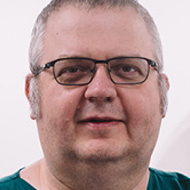“I feel very honoured to be able to give my input”

"So much positive and unprecedented change has happened in the last four years."
Matthew Rendle was recently re-elected to VN Council after receiving more than 1,000 votes. Here he reflects on his time on Council so far and shares his hopes for the future of the VN profession.
Matthew began his career in 1989 at a busy mixed-vet practice in Watford, after which he joined the Zoological Society of London (ZSL) to pursue his interest in zoo and wildlife nursing. Through this he gained experience in nursing across many species and was given the opportunity to travel.
After leaving ZSL in 2017, Matthew sought new challenges within exotics and wildlife medicine. He often delivers lectures to students at the RVC on subjects such as herpetological husbandry, diagnostic imaging and anaesthesia. He also completed a three-year term on BVNA Council, which enabled him to promote and raise the profile of the veterinary nursing profession across the UK.
Why did you decide to stand for re-election to VN Council?
Being on VN Council has allowed me to be involved in so many great projects, including various elements of VN Futures which in collaboration with the BVNA, is doing so much great work on so many chronic issues raised by the veterinary nursing profession. My first four-year term has flown by, being on VN Council has pushed me out of my comfort zone at times, but I have really enjoyed it and I feel like I am doing what I can to progress my profession.
What has being a member of the VN Council taught you about the veterinary nursing profession?
I have learnt so much about so many aspects of my profession, including all the work RCVS is doing to improve the challenges nurses face on a day-to-day basis. I am then able to reassure the nurses I work with and know about the huge amount of work currently going on, I feel very honoured to be able to give my input.
What changes have you seen so far, and how have you been involved?
So much positive and unprecedented change has happened in the last four years, the highlight for me has been working on the new post-registration qualification framework. This framework has already been taken up by various academic institutions and is already allowing nurses to take a qualification that demonstrates the diversity of the role and wealth of knowledge within the veterinary nursing profession. It makes me very proud and the qualification is something I would like to undertake in the future.
What are you hoping to achieve during your time on Council?
I would like to continue working on the projects I have been involved in over the last four years. I get great satisfaction out of being given the opportunity to do my bit to support and progress the profession and hopefully assist in continuing to improve it for the veterinary nurses working now and those joining our profession in the future.
Where do you see the veterinary nursing profession a decade from now?
That’s a really hard question, I started my veterinary nursing training 31 years ago and the profession I work in now is so much more advanced and professional than it was when I started. There is still work to do, but if we can achieve the same amount of progress in the next ten years as we have in the last, I will leave the profession in a much better state than when I joined it.
What do you feel the College can do to help better support its veterinary nurse members?
One thing that is clear from the last four years on VN council is the huge amount of work the RCVS is already doing for nurses, every day. I have had the opportunity to work with many of the RCVS teams and they are all engaged and dedicated to improving the veterinary nursing profession. In return, they need the same level of dedication and engagement from the profession itself, so I urge all veterinary nurses that are passionate for positive change, to read all the communications that come out from the RCVS and the BVNA and get involved. If I can get involved, anyone can!



 The BSAVA has opened submissions for the BSAVA Clinical Research Abstracts 2026.
The BSAVA has opened submissions for the BSAVA Clinical Research Abstracts 2026.